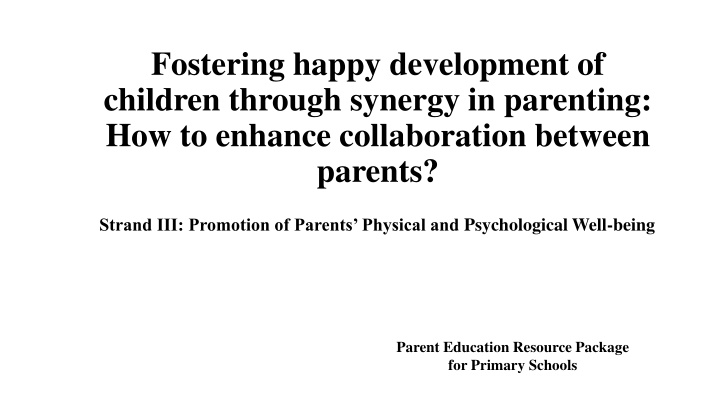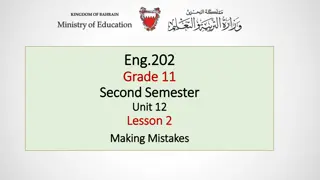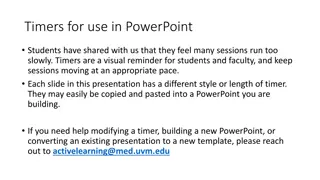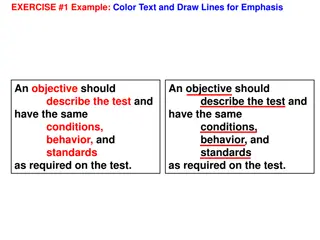
Enhancing Parent Collaboration for Children's Happy Development
Learn how to foster children's happy development through synergy in parenting by enhancing collaboration between parents. Understand the importance of working together, ways to improve collaboration, and acquiring conflict resolution skills. Research shows that good collaboration between parents leads to better outcomes for children in various aspects of their lives.
Download Presentation

Please find below an Image/Link to download the presentation.
The content on the website is provided AS IS for your information and personal use only. It may not be sold, licensed, or shared on other websites without obtaining consent from the author. If you encounter any issues during the download, it is possible that the publisher has removed the file from their server.
You are allowed to download the files provided on this website for personal or commercial use, subject to the condition that they are used lawfully. All files are the property of their respective owners.
The content on the website is provided AS IS for your information and personal use only. It may not be sold, licensed, or shared on other websites without obtaining consent from the author.
E N D
Presentation Transcript
Fostering happy development of children through synergy in parenting: How to enhance collaboration between parents? Strand III: Promotion of Parents Physical and Psychological Well-being Parent Education Resource Package for Primary Schools
Outline o Understand the importance of collaboration between parents o Understand ways to enhance collaboration between parents o Acquire the skills required to deal with conflicts arising from caring for children
The importance of collaboration between parents o When parents have a good collaborative relationship Children have a better relationship with their peers Children are better at dealing with conflicts Children have better grades at school Children have less behavioural problems Teubert, D., & Pinquart, M. (2010). The association between coparenting and child adjustment: A meta-analysis. Parenting: Science and Practice, 10(4), 286-307.
The importance of collaboration between parents o Scoring method for the Questionnaire on Parent Collaboration : Add the scores for odd-numbered questions (questions 1, 3, 5, 7, 9) and even-numbered questions (questions 2, 4, 6, 8, 10) respectively. Odd-numbered questions represent the level of collaboration between parents, while even- numbered questions represent the level of conflict between parents in caring for their children. A collaboration score of 10 or above indicates good collaboration between parents. A conflict score of 10 or below indicates good collaboration between parents. Margolin G., Gordis E. B., & John, R. S. (2001). Coparenting: A link between marital conflict and parenting in two- parent families. Journal of Family Psychology, 15(1), 3-21.
The importance of collaboration between parents oThere are two dimensions to parental collaboration: Collaboration Conflict Margolin G., Gordis E. B., & John, R. S. (2001). Coparenting: A link between marital conflict and parenting in two- parent families. Journal of Family Psychology, 15(1), 3-21.
The importance of collaboration between parents o The children are everything The parents do not have anything else to talk about except their children. o One strong and one weak One parent always dominates the other and verbally attacks the other parent. o Constant arguments The parents often get into arguments or have cold wars with each other. As children grow older, they gradually feel stressed by the excessive attention. After children realise who is the boss at home, they will gradually lose respect for the weaker parent. Children may feel scared or insecure, or they may feel guilty that they are causing discord between their parents. Gottman, J. M. & Silver, N. (2015). The seven principles for making marriage work. Seven Dials.
Ways to enhance collaboration between parents o Consistent expectations: Help children achieve the following goals How important is this to the father? How important is this to the mother? 1) Healthy Please rate these from 1 (least important) to 10 (most important). 2) Happy 3) Follows rules and listens to instructions 4) Able to express and manage emotions 5) Have good relationships with family members 6) Able to make good friends 7) Good grades at school 8) Be multi-talented or specialise in one area 9) Able to go to university 10)Able to contribute to society in the future 11) Have a high-paying job in the future 12) Able to build a happy family in the future
Ways to enhance collaboration between parents o Parents can discuss the following questions after completing the questionnaire separately: Father and mother ranked their parenting expectations according to their own ratings. Are they ranked in a similar order? Even if they are ranked in a similar order, how different are their ratings for each item? Which expectation they rated has the greatest difference? Looking back over the past month, did the father and mother have conflicts over their different opinions on parenting expectations? How did they handle these conflicts?
Ways to enhance collaboration between parents Consistent expectations: 1) Healthy Help children achieve the following goals 3 most important expectations to the father 3 most important expectations to the mother 2) Happy Use a to indicate the 3 most important expectations from the 12 expectations. 3) Follows rules and listens to instructions 4) Able to express and manage emotions 5) Have good relationships with family members 6) Able to make good friends 7) Good grades at school 8) Be multi-talented or specialise in one area 9) Able to go to university 10) Able to contribute to society in the future 11) Have a high-paying job in the future 12) Able to build a happy family in the future
Ways to enhance collaboration between parents o Parents can discuss the following questions after completing the questionnaire separately: How many of the three expectations selected by the father and mother overlap? How many are different? Father and mother explain their choices. Why did they think these three expectations the most important? Would they change their mind after listening to their partner s explanation? Looking back over the past month, did they spend the time with their children reflecting their expectations that they think most important? For example, if they think it is important for their children to be healthy, get good grades at school and have good relationships with family members, did they spend enough time doing sports, guiding children s study and homework as well as chatting and playing with their children over the past month?
Ways to enhance collaboration between parents o Clear division of childcare tasks between parents: Rate the following childcare tasks from 1 (exclusively taken care by the mother) to 5 (exclusively taken care by the father) to indicate Childcare tasks How will the father divide the tasks? How will the mother divide the tasks? 1) Waking children up on time 2) Preparing three meals per day for children 3) Taking care of children when they are sick 4) Buying daily necessities for children 5) Handling children s disciplinary problems 6) Handling children s social problems 7) Handling children s emotional problems 8) Handling problems among siblings 9) Handling matters between domestic helpers and children 10) Handling children s use of electronic products
Ways to enhance collaboration between parents o Clear division of childcare tasks between parents: Rate the following childcare tasks from 1 (exclusively taken care by the mother) to 5 (exclusively taken care by the father) to indicate Childcare tasks How will the father divide the tasks? How will the mother divide the tasks? 11) Taking children to do activities to burn up their energy 12) Chatting with children 13) Arranging activities in holidays 14) Arranging parent-child activities 15) Handling children s school related matters (such as signing notices and paying fees) 16) Handling children s interest class related matters (such as rescheduling classes and paying fees) 17) Picking up and dropping off children at school and extracurricular activity classes 18) Guiding children with their studies and homework 19) Participating in activities held by children s schools 20) Handling matters related to children s further studies
Ways to enhance collaboration between parents o Parents can discuss the following questions after completing the questionnaire separately: Do the father and mother have similar expectations for childcare? How much difference do the two parties have in their ratings for each task? In which task did the two parties have the biggest difference in their ratings? Is there a gap between the actual division of childcare tasks between the father and mother and their expectations? In which task was the gap most obvious? Looking back over the past month, did the father and mother have conflicts due to different expectations for the division of childcare? How did they handle these conflicts?
Ways to enhance collaboration between parents o Praise: Appreciate each other's efforts in caring for the children: The children are always laughing when you re at home! You have such a good sense of humour! No matter how tired you are, you always make time for our children to tell you about interesting things at school when you get home after work. You re so determined and loving! You attend parent seminars on Sundays to learn how you can support our children s development. You really love to learn! Gottman, J. (2018). The seven principles for making marriage work. Hachett. Gottman, J., & Gottman, J. (2017). The natural principles of love. Journal of Family Theory & Review, 9(1), 7-26.
Ways to enhance collaboration between parents Praise: Link your partner s behaviors with their inner strengths: Fairness Willpower Social Spirituality Self-control Knowledge Appreciation of beauty Creativity Forgiveness Bravery Love Fairness Curiosity Humility Leadership Kindness Gratitude Perseverance Social intelligence Prudence Humour Judgement Integrity Teamwork Self- Love of learning Zest Spirituality regulation Hope Perspective Rosen Grandon, J. R., Myers, J. E., & Hattie, J. A. (2004). The relationship between marital characteristics, marital interaction processes, and marital satisfaction. Journal of Counseling & Development, 82(1), 58-68.
Ways to enhance collaboration between parents Praise: Link your partner s behaviours with their inner strengths: Inner strength behaviour Strength 1: Strength 2: Strength 3:
How to deal with conflicts arising from caring for children o Common negative thoughts: Situation Negative thoughts He s so selfish! Your partner didn t buy stationery for your children, and they will need it for class tomorrow. She never takes our daughter to the playground. She s such an irresponsible parent! She salways on her phone and only cares about herself! After taking your children to the playground, you come home to see your partner on her phone. Your partner doesn t come out to greet you when you get home from work I have to take care of the baby after working hard, but he doesn t even greet me! He doesn t care about me at all! Feinberg, M. E., Kan, M. L., & Goslin, M. C. (2009). Enhancing coparenting, parenting, and child self-regulation: Effects of Family Foundations 1 year after birth. Prevention Science, 10, 276-285.
How to deal with conflicts arising from caring for children o Replacing negative thoughts with positive thoughts Situation More negative thoughts More positive thoughts He s so selfish! Maybe he neglected this matter because it just slipped his mind. Your partner didn t buy stationery for your children, and they will need it for class tomorrow. She takes our daughter to interest classes, but I want her to take our daughter to the playground with me. She takes care of our daughter at home every day. She also needs me time. He usually chats with me after I come home from work. Maybe he has something urgent to do today! She never takes our daughter to the playground. She s such an irresponsible parent! She salways on her phone and only cares about herself! After taking your children to the playground, you come home to see your partner on her phone. Your partner doesn t come out to greet you when you get home from work I have to take care of the baby after working hard, but he doesn t even greet me! He doesn t care about me at all! Feinberg, M. E., Kan, M. L., & Goslin, M. C. (2009). Enhancing coparenting, parenting, and child self-regulation: Effects of Family Foundations 1 year after birth. Prevention Science, 10, 276-285.
How to deal with conflicts arising from caring for children oUsing I messages When (specifically describe your partner s negative behaviour) I felt... (describe how you re feeling inside) Because... (describe the negative impact of the negative behaviour) I hope... (state your expectations) Erford, B. T. (2010). I-messages. 35 techniques every counselor should know. Pearson.
How to deal with conflicts arising from caring for children oExpressing thoughts and feelings clearing with I messages Situation I messages Your partner didn t buy stationery for your children, and they will need it for class tomorrow. When you told me that you didn t buy stationery for Ah B (the son), I felt disappointed because I was worried that Ah B wouldn t have stationery to use in class tomorrow. I hope you can write a reminder for yourself in your mobile phone next time. After taking your children to the playground, you come home to see your partner on her phone. When I saw you on your phone at home after I took our daughter to the playground, I felt that I missed you because I wanted the three of us to spend more time together. I hope we can find an opportunity to go to the playground together this month. Your partner doesn t come out to greet you when you get home from work When I came home after work yesterday and saw that you didn t come over to talk to me, I felt a little lonely because I really wanted to see you after I got home, I would be very happy even if you just said hi to me. I hope you can greet me before you continue working. Erford, B. T. (2010). I-messages. 35 techniques every counselor should know. Pearson.
How to deal with conflicts arising from caring for children oExpressing thoughts and feelings clearing with I messages Situation I messages 1) The exam week starts tomorrow, but my partner is still playing games with our children. 2) My partner didn t pick up our children from school on time, so our children waited for an hour at school. 3) My partner blamed me when I got angry while teaching our children to do their homework.
How to deal with conflicts arising from caring for children oExpressing thoughts and feelings clearing with I messages Situation I messages 4) These days, after getting home from work, I ve noticed that my partner has bought lots of snacks for our children. 5) My partner hasn t been home for dinner for many consecutive days. 6) My partner arranged various tutoring and interest classes for our children on the weekends.
How to deal with conflicts arising from caring for children Understanding your own conflict management style: How much you care about your own ideas and needs Collaborating Competing Compromising Avoiding Accommodating How much you care about your partner s ideas and needs Kilmann, R. H., & Thomas, K. W. (1977). Developing a forced-choice measure of conflict-handling behavior: The "MODE" instrument. Educational and Psychological Measurement, 37(2), 309-325.
How to deal with conflicts arising from caring for children o Different conflict management styles have different effects on children: Those who are collaborating or compromising can balance their own and others needs, so as to enhance collaboration between parents and reduce negative emotions in conflicts. Those who are competing often end up with a constant arguments or one strong and one weak collaboration type. Their children may think their parents are arguing because of them or may stop respecting the weaker parent. Those who are avoiding or accommodating often end up with a one strong and one weak collaboration type, which means their children may stop respecting the weaker parent. Kilmann, R. H., & Thomas, K. W. (1977). Developing a forced-choice measure of conflict-handling behavior: The "MODE" instrument. Educational and Psychological Measurement, 37(2), 309-325. Gottman, J. M. & Silver, N. (2015). The seven principles for making marriage work. Seven Dials.
How to deal with conflicts arising from caring for children o Try to change your conflict management style: Collaborating: Generally comes up with a win-win situation! Compromising: Thinks carefully to see if they can come up with a win-win situation. Competing: Actively invites others to express their ideas and needs in conflicts Avoiding: Adopts a positive attitude and actively expresses own ideas and needs. Accommodating: Attaches more importance to own ideas and needs and musters up the courage to express yourself. Kilmann, R. H., & Thomas, K. W. (1977). Developing a forced-choice measure of conflict-handling behavior: The "MODE" instrument. Educational and Psychological Measurement, 37(2), 309-325.
Conclusion o Understand the importance of collaboration between parents The level of collaboration and conflict between parents affects the mental health, behaviour and growth of their children o Understand ways to enhance collaboration between parents Consistent expectations: Find out what both parents think is the most important expectation for raising children Clear division of labour: Find out what both parents think is the most suitable division of childcare tasks Praise: Pay attention to your partner s behaviours and link them with their inner personality and strengths o Acquire the skills required to deal with conflicts arising from caring for children Positive thinking: Replacing negative thoughts with positive thoughts I messages: When I feel because I hope you can Understand your conflict management style and try your best to come up with a win-win situation






















